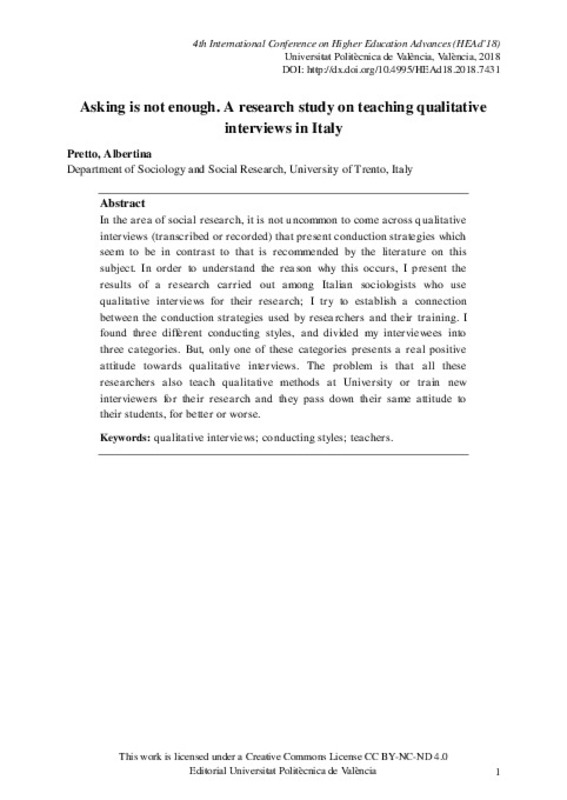JavaScript is disabled for your browser. Some features of this site may not work without it.
Buscar en RiuNet
Listar
Mi cuenta
Estadísticas
Ayuda RiuNet
Admin. UPV
Asking is not enough. A research study on teaching qualitative interviews in Italy
Mostrar el registro sencillo del ítem
Ficheros en el ítem
| dc.contributor.author | Pretto, Albertina
|
es_ES |
| dc.coverage.spatial | east=12.567379999999957; north=41.87194; name= Itàlia | |
| dc.date.accessioned | 2018-10-05T12:34:31Z | |
| dc.date.available | 2018-10-05T12:34:31Z | |
| dc.date.issued | 2018-07-02T12:34:31Z | |
| dc.identifier.isbn | 9788490486900 | es_ES |
| dc.identifier.issn | 2603-5871 | |
| dc.identifier.uri | http://hdl.handle.net/10251/109577 | |
| dc.description.abstract | [EN] In the area of social research, it is not uncommon to come across qualitative interviews (transcribed or recorded) that present conduction strategies which seem to be in contrast to that is recommended by the literature on this subject. In order to understand the reason why this occurs, I present the results of a research carried out among Italian sociologists who use qualitative interviews for their research; I try to establish a connection between the conduction strategies used by researchers and their training. I found three different conducting styles, and divided my interviewees into three categories. But, only one of these categories presents a real positive attitude towards qualitative interviews. The problem is that all these researchers also teach qualitative methods at University or train new interviewers for their research and they pass down their same attitude to their students, for better or worse. | es_ES |
| dc.description.uri | http://ocs.editorial.upv.es/index.php/HEAD/HEAD18 | es_ES |
| dc.format.extent | 8 | |
| dc.language | Inglés | es_ES |
| dc.publisher | Editorial Universitat Politècnica de València | es_ES |
| dc.relation.ispartof | 4th International Conference on Higher Education Advances (HEAD'18) | |
| dc.rights | Reconocimiento - No comercial - Sin obra derivada (by-nc-nd) | es_ES |
| dc.subject | Higher Education | es_ES |
| dc.subject | Learning | es_ES |
| dc.subject | Educational systems | es_ES |
| dc.subject | Teaching | es_ES |
| dc.subject | Qualitative interviews | |
| dc.subject | Conducting styles | |
| dc.subject | Teachers | |
| dc.title | Asking is not enough. A research study on teaching qualitative interviews in Italy | es_ES |
| dc.type | Comunicación en congreso | es_ES |
| dc.type | Capítulo de libro | es_ES |
| dc.identifier.doi | 10.4995/HEAD18.2018.7431 | es_ES |
| dc.rights.accessRights | Abierto | es_ES |
| dc.description.bibliographicCitation | Pretto, A. (2018). Asking is not enough. A research study on teaching qualitative interviews in Italy. Editorial Universitat Politècnica de València. 1-8. https://doi.org/10.4995/HEAD18.2018.7431 | es_ES |
| dc.description.accrualMethod | OCS | es_ES |
| dc.relation.conferencename | Fourth International Conference on Higher Education Advances | es_ES |
| dc.relation.conferencedate | Junio 20-22,2018 | es_ES |
| dc.relation.conferenceplace | Valencia, Spain | es_ES |
| dc.relation.publisherversion | http://ocs.editorial.upv.es/index.php/HEAD/HEAD18/paper/view/7431 | es_ES |
| dc.description.upvformatpinicio | 1 | |
| dc.description.upvformatpfin | 8 | es_ES |
| dc.type.version | info:eu-repo/semantics/publishedVersion | es_ES |
| dc.relation.pasarela | OCS\7431 | es_ES |








